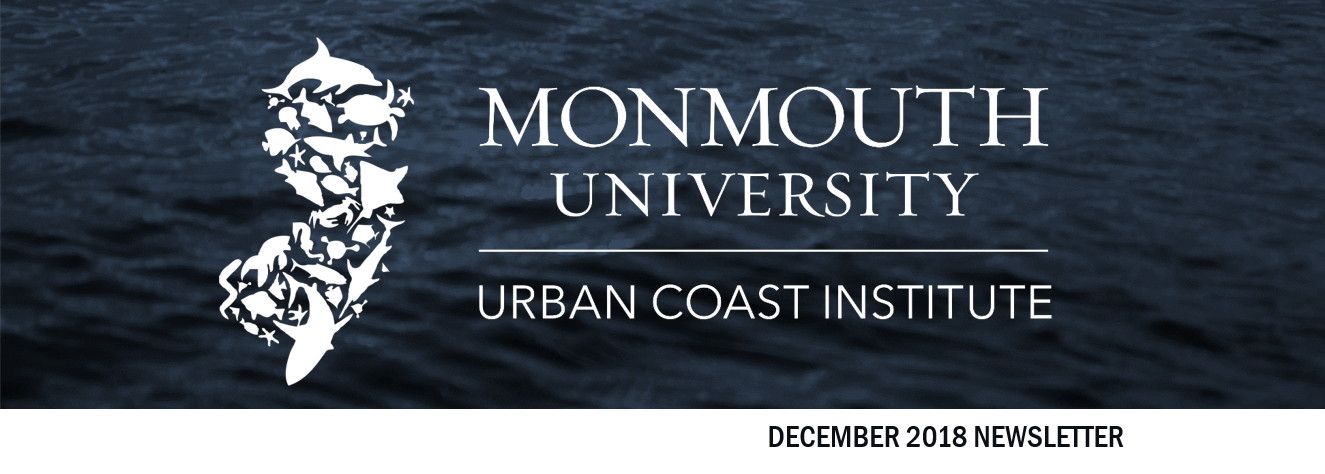
Monmouth, Rockefeller Universities Host National Conference on Marine Environmental DNA
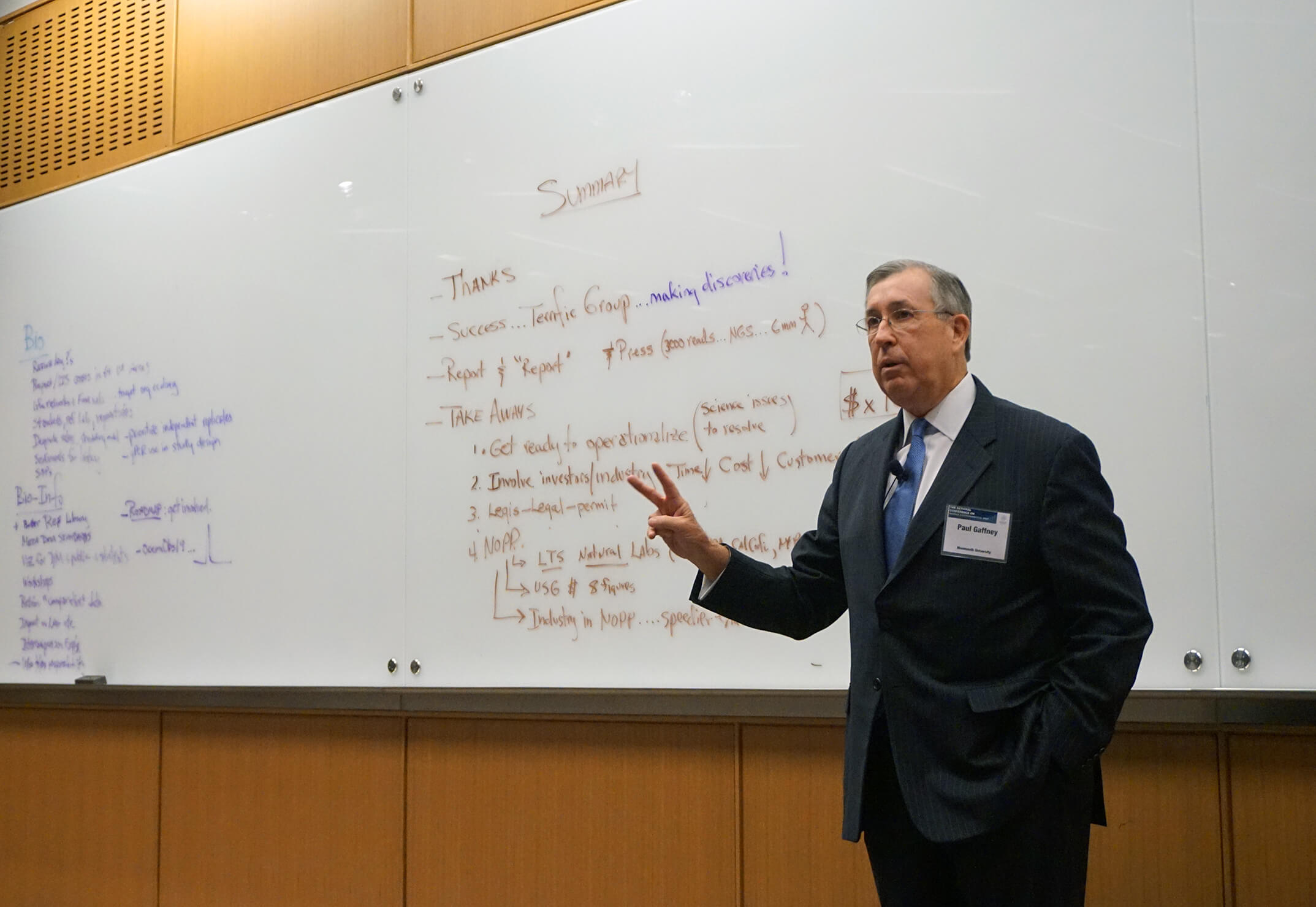
Monmouth University staff and students gathered with 100 of the nation’s leading practitioners of environmental DNA (eDNA) science on Nov. 29 and 30 to share discoveries, state-of-the-art technologies and new methods for this groundbreaking marine life detection method.
The National Conference on Marine Environmental DNA was the third in a series of four conferences (The Marine Science & Policy Series) being organized jointly by the Urban Coast Institute (UCI) and The Rockefeller University Program for the Human Environment (PHE). The events are held annually on rotating campuses, with the 2016 National Ocean Exploration Forum at Rockefeller University in New York City, the 2017 Mid-Atlantic Blue Ocean Economy symposium at Monmouth University, and the latest event back in Manhattan. The conference was capped by a luncheon honoring National Academy of Sciences President Marcia McNutt with the UCI’s Champion of the Ocean Award.
Sampling for eDNA is an approach that allows scientists to confirm the presence of fish and other organisms by testing for trace amounts of genetic material that they shed into the water. The technique holds the promise of being less expensive, more humane and more revealing than other longstanding scientific methods that rely on physically catching or observing animals. Monmouth has piloted research in local waters such as Wreck Pond, Sandy Hook Bay, Deal Lake and the Navesink and Shrewsbury rivers.
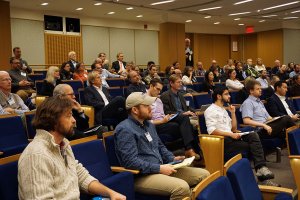 The conference highlighted insights provided by eDNA to date and its potential to further scientific knowledge and inform ocean management. One of the innovations discussed was “Go Fish,” an eDNA testing tool developed by PHE Senior Research Associate Mark Stoeckle that can confirm the presence of a given species inexpensively and within a few days. He noted that rapid access to eDNA data could be used to aid authorities with time-sensitive decisions.
The conference highlighted insights provided by eDNA to date and its potential to further scientific knowledge and inform ocean management. One of the innovations discussed was “Go Fish,” an eDNA testing tool developed by PHE Senior Research Associate Mark Stoeckle that can confirm the presence of a given species inexpensively and within a few days. He noted that rapid access to eDNA data could be used to aid authorities with time-sensitive decisions.
One such example was provided by McNutt, who described how eDNA is being used to monitor the threat of invasive Asian carp entering the Great Lakes. Researchers are employing eDNA tests as an early warning system to detect whether the fish have made it past barriers set up in the lakes’ tributaries to thwart their advance.
A goal of the conference was to initiate a commitment by leading scientists and stakeholders to take up eDNA as a cooperative national or regional research theme.
“eDNA opens the door to cheap, frequent, widespread, potentially automated monitoring of the diversity, distribution, and abundance of aquatic life,” said Monmouth University President Emeritus and UCI Ocean Policy Fellow Paul G. Gaffney II. “Government agencies need to take notice.”
UCI Director Tony MacDonald credited PHE Director Jesse Ausubel for his vision in recognizing eDNA’s potential to solve problems and raising its profile throughout the scientific community.
“There is nothing more important than a big idea, and I think this eDNA conference is another example of how a big idea can inspire everybody in the work you do,” MacDonald told the gathering. “Everything you do in science, no matter how detailed, is rooted in a big idea.”
Additional Links
National Conference on Marine Environmental DNA website
Read coverage from National Geographic
Conference program (PDF)
National Academy of Sciences President Honored as UCI Ocean Champion
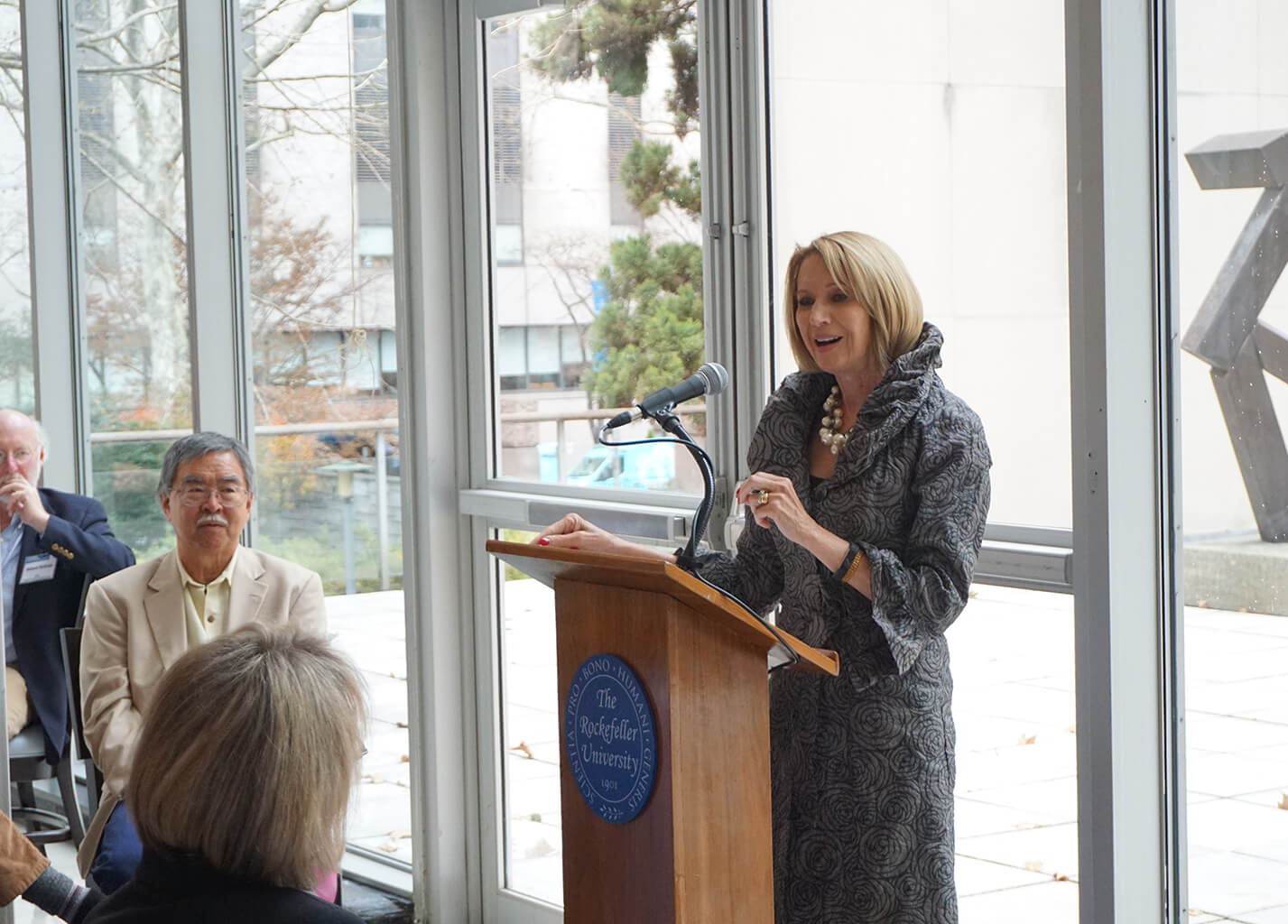
Marcia McNutt recalled the state of oceanography at the start of her career in the 1970s, when the research methods employed were still largely the same as those of the HMS Challenger exhibition of 1872-76. Everything still hinged on the collection of physical evidence through means such as dredging and net tows. But when she joined the Monterey Bay Aquarium Research Institute as its director in 1997, she sensed a transformation was under way, thanks in large part to the vision of founder David Packard.
“He said, ‘Send instruments into the ocean, not people. Bring back data, not samples.’ And it was a thrilling to think about how we could revolutionize oceanography by doing just that,” said McNutt, now the president of the National Academy of Sciences.
The UCI recognized McNutt with its highest honor, the National Champion of the Ocean Award, in a Nov. 30 ceremony at The Rockefeller University in New York City. The special award luncheon capped off a two-day National Conference on Marine Environmental DNA, organized jointly by Rockefeller and Monmouth universities.
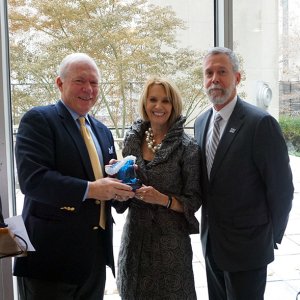 The Champion of the Ocean Awards were established in 2005 to honor individuals who have helped ensure coasts and oceans are clean, safe, sustainably managed and preserved for the benefit and enjoyment of future generations. Past honorees include marine biologist Sylvia Earle, ocean explorer Robert Ballard, former Secretary of Defense and CIA Director Leon Panetta, and oceanographer Jean-Michael Cousteau.
The Champion of the Ocean Awards were established in 2005 to honor individuals who have helped ensure coasts and oceans are clean, safe, sustainably managed and preserved for the benefit and enjoyment of future generations. Past honorees include marine biologist Sylvia Earle, ocean explorer Robert Ballard, former Secretary of Defense and CIA Director Leon Panetta, and oceanographer Jean-Michael Cousteau.
“If I had to make a list of my own ocean heroes, it would be exactly the people who you have honored, so I am thrilled to join them,” McNutt said.
McNutt said she is excited about the scientific advances that are being made thanks to the rapid evolution of technology. Today’s tools are making it possible to test waters for their health and chemistry far faster than ever before, and gather massive volumes of data that can help scientists understand aquatic environments as living systems. That is crucial, McNutt said, because it can help predict how they’ll evolve in the future.
“I worry today because we’re still getting too many surprises, and the surprises are unpleasant,” she said. “More are sure to come if we’re not more knowledgeable of how these systems behave when they’re stressed.”
For example, McNutt said research now shows that when plastics break down, they release aromatics that mimic the scents of prey for turtles and other marine animals, which are in turn attracted to the substances and eat them. She also mentioned ocean acidification and warming as areas with major implications that are not yet fully understood.
“I believe that basic science, basic understanding of this large, bio-geochemical reactor in the ocean is the only thing that’s going to give us this understanding,” she said. “I hope that it’s not going to be only through observation that we find out. We need to know better ahead of time so we can intervene earlier, so we can have healthy oceans and healthy waterways.”
Additional Links
- Marcia McNutt biography
- The Champion of the Ocean Award
- The National Conference on Marine Environmental DNA
Polling Shows Climate Concerns on the Rise (with Radio Interview)
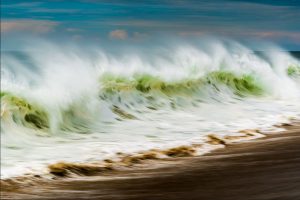
An increasing number of Americans believe climate change is occurring, including a majority who now see this issue as a very serious problem, according to the latest Monmouth University Poll. Most Americans are optimistic that there is still time to prevent the worst effects of climate change and support taking action, but they are not confident in the government’s ability or willingness to do something about it. Click here to read the press release and full poll numbers and here to listen to UCI Director Tony MacDonald discuss the data on the public radio show Living on Earth.
A Perfect Day Aboard the R/V Heidi Lynn Sculthorpe
The latest installment of Monmouth University’s “Perfect Day” commercial series features its newest and largest research vessel, the 49-foot Heidi Lynn Sculthorpe. The spot shows students Charlie Vasas and Lauren Kelly working with UCI Marine Scientist Jim Nickels on the Sandy Hook Bay before heading back to the lab with Endowed Associate Professor of Marine Science Jason Adolf.
Monmouth Students Take Marine Science Lessons to Rumson School
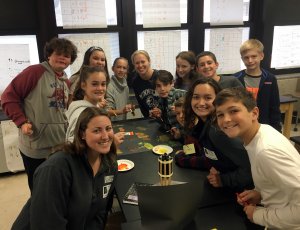 Why do dead fish float? Does the Navesink River have a pollution problem? And what’s that smell coming off the water with the breeze? Rumson seventh graders came up with a long list of questions during a recent field trip to the Navesink, but Dr. Jason Adolf’s Principles of Marine Biology (BY 341) students had the answers.
Why do dead fish float? Does the Navesink River have a pollution problem? And what’s that smell coming off the water with the breeze? Rumson seventh graders came up with a long list of questions during a recent field trip to the Navesink, but Dr. Jason Adolf’s Principles of Marine Biology (BY 341) students had the answers.
The Monmouth University juniors and seniors delivered lessons to six of science teacher Jenn Crow’s seventh grade classes at the Forrestdale School on Nov. 27. Adolf, an endowed associate professor of marine science, said part of his course assignment was for his students to answer as many of the questions as possible while giving presentations on topics they’re studying at Monmouth. They included discussions on the impacts of plastics in marine environments, bioluminescence, biofluorescence, marine food chains and more.
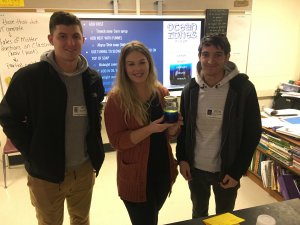 The Monmouth students came up with some hands-on exercises to make the lessons engaging for the young scientists. In a lesson on stratification in the ocean, students mimicked the layering that naturally occurs by filling jars with household liquids like vegetable oils, honey and water.
The Monmouth students came up with some hands-on exercises to make the lessons engaging for the young scientists. In a lesson on stratification in the ocean, students mimicked the layering that naturally occurs by filling jars with household liquids like vegetable oils, honey and water.
“A lot of our marine and environmental biology and policy majors go into teaching, so this was directly applicable to what they’re doing,” Adolf said. “I also want students to learn not only how to communicate science to a K-12 audience, but to understand that’s part of science, no matter what level you’re working at.”
The Monmouth University School of Science and Urban Coast Institute have partnered with Rumson on several educational initiatives, most notably a joint plan to develop the Monmouth Marine and Environmental Field Station on municipal property along the Navesink River. Monmouth faculty and students are also working with the borough to transform a pond on the Forrestdale property into an outdoor educational space.
Abate Completes UK Lecture Tour on Climate Change and Wildlife Topics
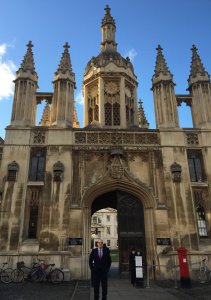 Rechnitz Family/UCI Endowed Chair in Marine and Environmental Law and Policy Randall Abate traveled to the U.K. from Nov. 28-Dec. 6 to deliver invited presentations at three universities.
Rechnitz Family/UCI Endowed Chair in Marine and Environmental Law and Policy Randall Abate traveled to the U.K. from Nov. 28-Dec. 6 to deliver invited presentations at three universities.
First, he discussed his forthcoming book, Climate Change and the Voiceless: Protecting Future Generations, Wildlife, and Natural Resources (Cambridge University Press, forthcoming August 2019), with professors and graduate students at the University of Cambridge on Nov. 29. The book talk was hosted as the final lecture of the semester in the Cambridge Centre for Environment, Energy and Natural Resource Governance Thursday Seminar Series. The series featured distinguished speakers from the University of Cambridge and universities in the Netherlands, Spain, Chile, and India. Professor Abate was one of only two invited speakers from the US in this series.
Professor Abate then traveled to London to deliver a second talk on his Climate Change and the Voiceless book to professors, graduate students, and lawyers at King’s College on Nov. 30. The event was hosted by the King’s College Climate Law and Governance Reading Group.
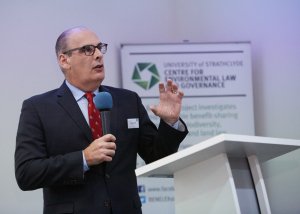
He concluded his U.K. tour with a stop in Glasgow, Scotland, for two presentations at the University of Strathclyde. They included a third talk on Climate Change and the Voiceless Dec. 4 and a presentation titled, “Ocean Iron Fertilization and Indigenous Peoples’ Right to Food: Leveraging International and Domestic Law Protections to Enhance Access to Salmon in the Pacific Northwest,” to approximately 75 professors, graduate students, and lawyers at a conference on Dec. 5. The conference, “A Vision for Ocean Law Governance: 2020-2030 and Beyond,” featured experts on ocean governance topics from the U.K., Canada, the Caribbean, and the South Pacific. Professor Abate was the only invited speaker from the US.
Herrington Hosts Panel, Presents Ocean City Flood Work at AGU Conference
UCI Associate Director Tom Herrington shared his experience working with community members to find solutions for chronic nuisance flooding in Ocean City, New Jersey, at the American Geophysical Union’s (AGU) Fall Meeting. Held Dec. 10-14 in Washington, DC, the event assembled thousands of researchers dedicated to physical sciences spanning from the bottom of the oceans to deep space.
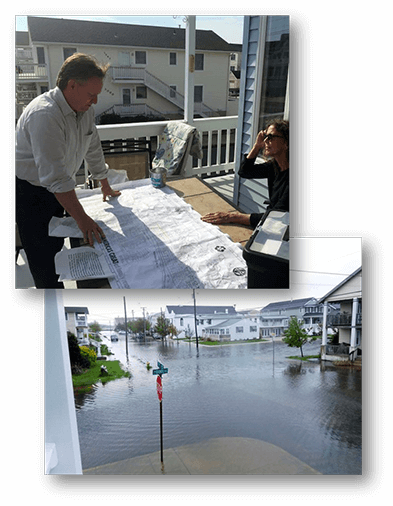 Herrington’s Ocean City work is being carried out through the AGU’s Thriving Earth Exchange (TEX) program, which pairs scientists with local communities to solve problems on a pro bono basis. An Ocean City native, Herrington has volunteered his time to the effort in his capacity as both a UCI staff member and New Jersey Sea Grant Consortium coastal community resilience specialist.
Herrington’s Ocean City work is being carried out through the AGU’s Thriving Earth Exchange (TEX) program, which pairs scientists with local communities to solve problems on a pro bono basis. An Ocean City native, Herrington has volunteered his time to the effort in his capacity as both a UCI staff member and New Jersey Sea Grant Consortium coastal community resilience specialist.
The barrier island community has seen flooding increase in frequency and severity over the years, to a point where high tides can cause disruptions and damage without rain. Herrington worked with members of a grassroots community flooding group to examine the source and causes of the flooding and identify long-term solutions that would remain effective in the face of sea level rise and the more intense storms wrought by climate change.
Through the partnership, Herrington has trained local residents to conduct citizen science work that will help build a better understanding of the issues. The community activists have begun discussions with city and state officials about implementing some of their ideas.
“Our work together has empowered them to use science to answer their own questions,” Herrington said. “I also found that building a better comfort level with the science has helped them become much better communicators when they’ve needed to approach the mayors and town councils to discuss the issues.”
Herrington also facilitated a panel at the conference focused on community engagement around scientific issues. It featured seven speakers from around the country plus another eight affiliated poster sessions in the conference hall.
UCI Hosts Climate Change Discussion with Pallone, Environmental Leaders
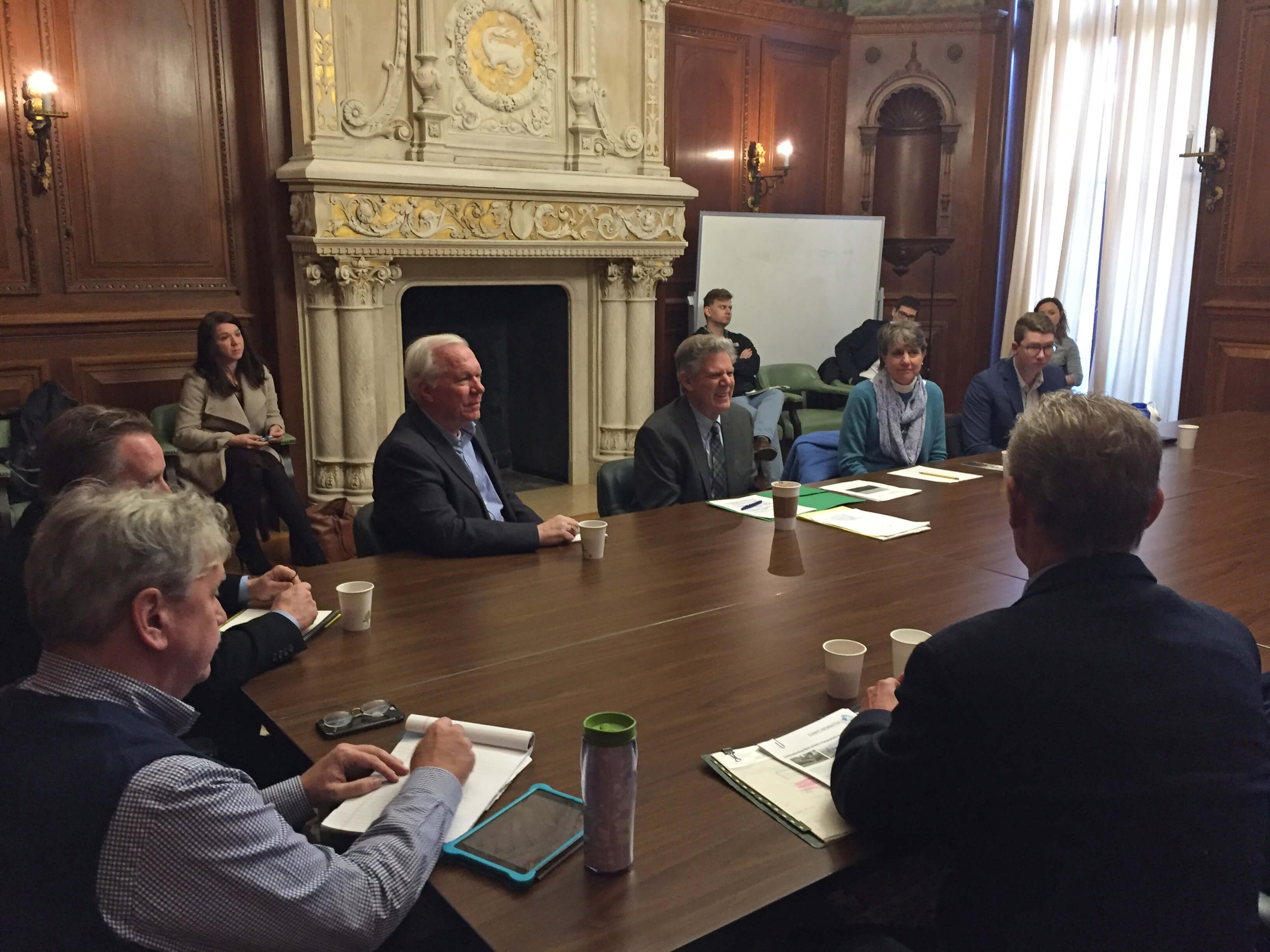
Congressman Frank Pallone met with the UCI and other New Jersey environmental leaders at Monmouth University Dec. 18 to discuss the urgent need to address climate change. Watch an NJTV News segment about the meeting.
Webinar Demonstrates Ocean Data Portal’s AIS Vessel Traffic Maps
UCI Communications Director Karl Vilacoba co-hosted a Dec. 11 webinar covering the Mid-Atlantic Ocean Data Portal’s Automatic Identification System (AIS) vessel traffic maps. Vilacoba and Doug Simpson, recreational boating safety specialist for the Coast Guard’s 5th District Waterways Management Branch, walked users through the maps and shared insights on what the maps show and how they can influence decision-making.
